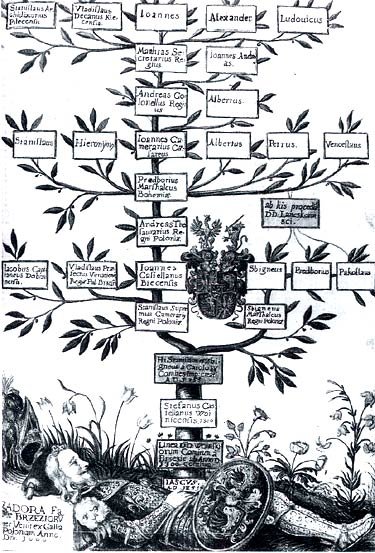Category Archive 'Social Mobility'
01 Nov 2019


A view of my hometown, Shenandoah, Pennsylvania, from the southwest, in the vicinity of the West Shenandoah Colliery, overlooking the culm banks, circa 1910. The writing says in Lithuanian: “Ar ne grazios apylenkis?” (sarcastically) “Are not the surroundings beautiful?” The location of the Lithuanian church is also marked by hand.
The Economist quotes a British DNA study contending that it wasn’t brains or character or superior family culture that caused the lucky ones who got out to leave. No, it was deterministic genes.
To establish baselines for their work, Dr Abdellaoui, Dr Visscher and their colleagues turned first to 33 published studies that used a technique called genome-wide association study. This is intended to discern the contributions to a trait of large numbers of genetic differences that each have a small effect. It concentrates on so-called single-nucleotide polymorphisms (SNPs)—places in the DNA where an individual genetic “letter†routinely varies from person to person. There are, for example, about 100,000 SNPs that affect height. On average, each makes a contribution, either positive or negative, of 0.14mm to someone’s adult stature. This is in contrast to Mendelian variations, where a single difference between individuals has a pronounced effect—such as the difference between brown and blue eyes.
Each of the 33 baseline studies identified large numbers of SNPs that had positive or negative effects on a particular trait: extroversion, heart disease, height, body fat, age at menopause, recreational drug use and so on. The researchers then applied these SNP patterns to the records of 450,000 UK Biobank participants, and asked various questions. One thing they looked for was geographical clustering of SNPS related to individual traits. This, they discovered in abundance. Of the 33 traits under consideration, 21 showed evidence of SNP-related geographical clustering.
The most strongly clustered of all, they found were SNPS for educational attainment (ie, how many years an individual had spent at school and college). SNPs lowering educational attainment were particularly clustered in former coal-mining areas. These are places that have seen a lot of internal migration, both inward, when the mines were developed during the late 18th and 19th centuries, and outward, after the second world war, as mining shrank from being one of Britain’s biggest employers to its current state of near non-existence.
Dr Abdellaoui and Dr Visscher were able, from their studies of the biobank’s records, to chart the effects of the more recent, outward migration. They divided participants into four groups: those born in mining areas who had subsequently left; those born in mining areas who had stayed; those born outside mining areas who had moved into one; and those who had never lived in a mining area. The results were stark. People in the first group, outward migrants from mining areas, had significantly more educational-attainment-promoting SNPS, and fewer damaging ones, than any of the other groups, while people in the second group, stay-at-homes in mining areas, had the opposite.
Though not quite so sharply as with educational achievement, this pattern was also reflected in all but one of the other 20 SNP-related traits the researchers looked at. With the exception of bipolar disorder, the best outcomes were found in outward migrants from coalfields and the worst in stay-at-homes. The healthy, in other words, depart. The less healthy remain.
The upshot is a vicious spiral. That young, ambitious, healthy people tend to leave economically deprived areas is hardly news. But to see that written clearly in their DNA, which they take with them when they leave, while the converse is written in the DNA of those who stay behind, raises questions of nature and nurture that society is ill-equipped to answer, and possibly unwilling to confront.
RTWT
10 Mar 2018


Robert Boyers describes how, long ago, his professor, at the cost of some social discomfort, summoned him to his office and did him a very great favor.
In my freshman year at Queens College, I had a strange awakening—strange in that the attendant, overmastering emotion was a combination of humiliation and pleasure. My English professor had called me to his desk and handed me the A+ paper I had written on Orwell’s Homage to Catalonia and suggested that I make an appointment to see him. This was no ordinary suggestion at the City University of New York, where professors never scheduled regular office hours and only rarely invited students to private conferences.
I was uneasy about the meeting, though I imagined that Professor Stone wished simply to congratulate me further, perhaps even to recommend that I join the staff of the college literary magazine, or to enlist my assistance as a tutor. Delusions of grandeur. Modest grandeur.
Professor Stone’s office had been carved out of a warren of rooms in the fourth-floor attic of the English Department building, where I was greeted with a warm handshake and a “delighted you could come.†Though the encounter took place almost 60 years ago, I remember everything about it—the few books scattered on a small wooden table, the neatly combed silver hair on the professor’s head, his amiable, ironic eyes. Most clearly I remember the surprising moment when another professor named Magalaner was called in and stood next to Professor Stone, both men smiling and looming ominously over me. It was then that I was asked to describe—in a few sentences, or more, don’t hesitate—the paper I’d written on Orwell.
Which of course I did, picking up steam after the first few sentences of diffident preamble, until Professor Stone asked me to stop, that’s quite enough, and then turned to his colleague with the words “see what I mean?†and Magalaner assented. The two men only now pulled over two chairs and sat down, close enough that our knees almost touched, and seemed to look me over, as if taking my measure. Both of them were smiling, so that again I speculated that I was to be offered a prize, a summer job, or who knew what else.
“I’ve a feeling,†Professor Stone said, “that you may be the first person in your family to go to college.â€
“It’s true,†I replied.
“You write very well,†he offered.
“Very well,†said Magalaner, who had apparently also read my paper.
“But you know,†Stone went on, edging his chair just a bit closer to mine, “I didn’t call you here to congratulate you, but to tell you something you need to hear, and of course I trust that you’ll listen carefully—with Professor Magalaner here to back me up—when I tell you, very plainly, that though you are a bright and gifted young fellow, your speech, I mean the sounds you make when you speak, are such that no one will ever take you seriously. I repeat, no one will ever take you seriously, if you don’t at once do something about this. Do you understand me?â€
I’ve told this story over the years, starting on that very first night with my teenage sister, explaining what I understood: namely, that a man I admired, who had reason to admire me, thought that when I opened my mouth I sounded like someone by no means admirable. It was easy to accept that no one close to me would have mentioned this before, given that, presumably, we all shared this grave disability, and failed to think it a disability at all. Professor Stone didn’t sound like anyone in our family, we may have thought, simply because, after all, he was an educated man and was not supposed to sound or think like us.
In any event, my teacher moved at once to extract from me a promise that I would enroll in remedial speech courses for as long as I was in college, and not “so much as consider giving them up, not even if you find them tedious.†The proposal left me feeling oddly consoled, if also somewhat ashamed. Consoled by the thought that there might be a cure for my coarse Brooklynese, as my teacher referred to it, and that the prescription was indisputably necessary. Unsure whether to thank my interlocutors or just stand up and slink ignominiously away, I agreed to enroll immediately in one of those speech courses, ending the meeting with an awkward, “Is that all?â€
A former student, hearing my story a few years ago at our dinner table, after telling her own tale of a recent humiliation, asked, “Who the fuck did that guy think he was?†and added that he was “lucky you didn’t just kick his teeth out.†She was concerned, clearly, that even after so many years, my sense of self might still be at risk, the injury still alive within me. And yet, though I’ve often played out the whole encounter in my head, I had decided within hours of my escape that I had been offered a gift. An insult as well, to be sure, but delivered not with an intention to hurt but to save and uplift. It would have been easy to be offended by the attempt to impress upon someone so young the idea that he would undoubtedly want to become the sort of person whose class origins would henceforth be undetectable. But I had not been programmed to be offended, and was, in my innocent way, ambitious to be taken seriously, and though I rapidly came to loathe the speech exercises to which I was soon subjected, I thought it my duty and my privilege to be subjected to them. Night after night, standing before the mirror in my parents’ bathroom, I shaped the sounds I was taught to shape, and I imagined that one day Professor Stone would beam with satisfaction at the impeccably beautiful grace notes I would produce.
RTWT
I arrived at Yale in 1966 from a working class background in an Appalachian coal town. I had probably already shed my indigenous regional accent, but I was still undoubtedly horribly unpolished and decidedly non-U in all sorts of social-mobility-limiting ways. Yale professors, to my knowledge at least, never stooped to help out in manner of Professor Stone, but at Yale we had lots of judgmental and intolerant peers, from the poshest families, straight out of the nation’s top prep schools.
If you showed up wearing an unsuitable jacket, were badly groomed, or otherwise failed to meet proper Yale standards, it did not take long for you to hear about it. Our upperclass lords and masters in student organizations were not in the least inhibited in colorfully denouncing all freshmen failures and deficiencies. If you wanted to go anywhere, or do anything, you got with the program.
Today, of course, all that has changed. Coats and ties have gone the way of Nineveh and Tyre. Yale has been coed fifty years. Today’s students are typically left-wing snowflakes, thoroughly indoctrinated in intersectionality and the politics of identity. The process of removing Cockney-Flower-Girl mobility-limiting speech habits, poor grooming, and inappropriate forms of dress must still go on, but the process of sanding down rough edges must take place highly diplomatically and with great care. The former devastating quip has, I expect, been replaced with a minutely raised eyebrow. In the case of the most protected castes of students, I suppose, that process may not go on at all.
13 Feb 2013


The legendary knight Zadora (supposed ancestor of the Polish Lanckoroński family) lies happy in his grave, contemplating with satisfaction the array of illustrious future generations (literally) springing from his loins.
Gregory Clark, who studies family mobility in various countries over the centuries, wants to puncture some mythical contemporary assumptions and expectations.
Studies of social mobility using surnames suggest two things. Social mobility rates are much lower than conventionally estimated. And social mobility rates estimated in this way vary little across societies and time periods. Sweden is no more mobile than contemporary England and the USA, or even than medieval England. Social mobility rates seem to be independent of social institutions (see the other studies on China, India, Japan and the USA now linked here). …
Conventional estimates of social mobility, which look at just single aspects of social status such as income, are contaminated by noise. If we measure mobility on one aspect of status such as income, it will seem rapid.
But this is because income is a very noisy measure of the underlying status of families. The status of families is a combination of their education, occupation, income, wealth, health, and residence. They will often trade off income for some other aspect of status such as occupation. A child can be as socially successful as a low paid philosophy professor as a high paid car salesman. Thus if we measure just one aspect of status such as income we are going to confuse the random fluctuations of income across generations, influenced by such things as career choices between business and philosophy, with true generalised social mobility.
If these estimates of social mobility were anywhere near correct as indicating true underlying rates of social mobility, then we would not find that the aristocrats of 1700 in Sweden are still overrepresented in all elite occupations of Sweden. Further, the more equal is income in a society, the less signal will income give of the true social status of families. In a society such as Sweden, where the difference in income between bus drivers and philosophy professors is modest, income tells us little about the social status of families. It is contaminated much more by random noise. Thus it will appear if we measure social status just by income that mobility is much greater in Sweden than in the USA, because in the USA income is a much better indicator of the true overall status of families.
Many commentators automatically assume that low intergenerational mobility rates represent a social tragedy. I do not understand this reflexive wailing and beating of breasts in response to the finding of slow mobility rates. The fact that the social competence of children is highly predictable once we know the status of their parents, grandparents and great-grandparents is not a threat to the American Way of Life and the ideals of the open society.
One ray of sunshine for those with a passion for upward mobility ought to be the reflection that History has not always been kind to families of talent and distinction. One key factor in the spectacular story of American development and success is the fact that America has provided a refuge and a second chance at opportunity to History’s losers. From the cavaliers who were defeated in England’s 17th century Civil War to my own Lithuanian ancestors dispossessed and occupied by Russia, the New World offered escape from ruin at home and (over time, at least) another chance.
Your are browsing
the Archives of Never Yet Melted in the 'Social Mobility' Category.
/div>

Feeds
|






